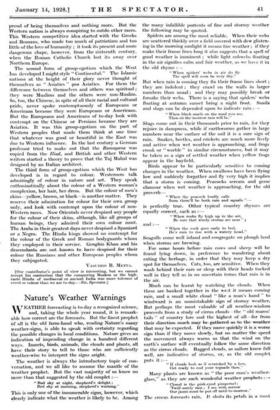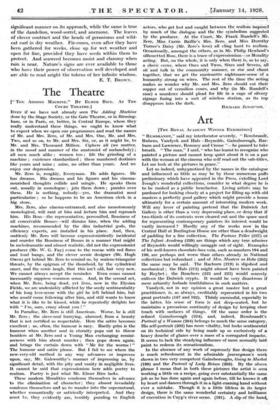Nature's Weather Warnings
wHEATER forecasting is to-day a recognized science, and, taking the whole year round, it is remark- able how correct are the forecasts. But the finest prophet of all is the ollit farm-hand who, reading. Natuids many weather-signs, is able to speak with certainty regarding the possible changes in local conditions. Nature gives an indication of impending change in a hundred different ways. Insects, birds, animals, the clouds and plants, all have their story to tell to those who are sufficiently weather-wise to interpret the signs aright.
The weather is always the introductory topic of con- versation, and we all like to assume the mantle of the weather prophet. But the vast majority of us know no more than that suggested by the old couplet :—
"Red sky at night, shepherd's delight; Red sky at morning, shepherd's warming."
This is only one of the innumerable signs, however, which clearly indicate what the weather is likely to be. Among the many infallible portents of fine and stormy weather the following may be quoted.
Spiders are among the most reliable. When their webs are scattered thickly over a field covered with dew glisten- ing in the morning sunlight it means fine weather ; if they make their frame lines long it also suggests that a spell of good weather is imminent ; while light cobwebs floating in the air signifies calm and fair weather, as we have it in the old rhyme :— " When spiders' webs in air do fly The spell will soon be very dry."
But when rain is coming they fix their frame lines short ; they are indolent ; they crawl on the walls in larger numbers than usual ; and they may possibly break or forsake their webs. There is a saying that spiders' webs floating at autumn sunset bring a night frost. Snails and slugs can be depended upon to indicate rain "When black snails on the road you see,
Then on the morrow rain will be."
Slugs come out in their thousands prior to rain, for they rejoice in dampness, while if earthworms gather in large numbers near the surface of the soil it is a sure sign of rain. Snakes, beetles, and crickets are much more lively and active when wet weather is approaching, and frogs croak or " warble " in similar circumstances, but it may be taken as a sign of settled weather when yellow frogs appear in the hayfield.
Birds appear to be particularly sensitive to coming changes in the weather. When swallows have been flying low and suddenly forgather and fly very high it implies that a storm is coming. Peacocks scream and geese clamour when wet weather is approaching, for the old proverb-
" When the peacock loudly calls Soon there'll be both ram and squalls "-
is perfectly true. Other typical country rhymes are equally correct, such as :— " When rooks fly high up in the air, Be sure that windy storms are near" ;
" When the cock goes early to bed, He's sure to rise with a watery head."
Seagulls come well 'inland and congregate on plough land when storms are brewing.
For. some hours -before rain- cows -and sheep will be found lying down, in preference to wandering about eating the herbage, in order that they may keep a dry spot for themselves. Cats, too, are sensitive. When they wash behind their ears or sleep with their heads tucked well in they tell us in no uncertain terms that rain is in the air.
Much can be learnt by watching the clouds. When these are banked together in the weit it means coming rain, and a small white cloud "like a man's hand" to windward is an unmistakable sign of stormy weather. But perhaps the most valuable of all weather-wisdom proceeds from a study of cirrus clouds—the "old mares', tails" of country lore and the highest of all—for from their direction 'much may be- gathered-as -to the weather that may be expected. If they move quickly it is a worse sign than if they move slowly, but no matter the speed the movement always warns us that the wind on the earth's surface will eventually follow the same direction as the cirrus clouds. Ragged clouds, as sailors know full well, are indicative of storms, or, as the old couplet puts it :— "If clouds look as if scratched by a hen, Get ready to raef your topsails then."
Many plants are known as "the poor man's weather- glass," as they are such wonderful weather prophets :— " Closed is the pink-eyed pimpernel ; 'Twill surely rain ; I see with sorrow
Our jaunt must be put off until to-morrow."
The crocus forecasts rain. It shuts its petals in a most and :— significant manner on its approach, while the 'same is tine of the dandelion, wood-sorrel, and anemone. The rewires Of clover contract and the heads of geraniums and Wild- cat curl in dry weather. Fir-cones, even after they have been, gathered for weeks, close up for wet weather and open for fine, provided they have seeds within, them to protect. And seaweed becomes moist and clammy when rain is near. Nature's signs are ever available to those who have their power of observation well developed and are able to read- aright the tokens of her infinite wisdom.
E. T. BROWN.



































 Previous page
Previous page